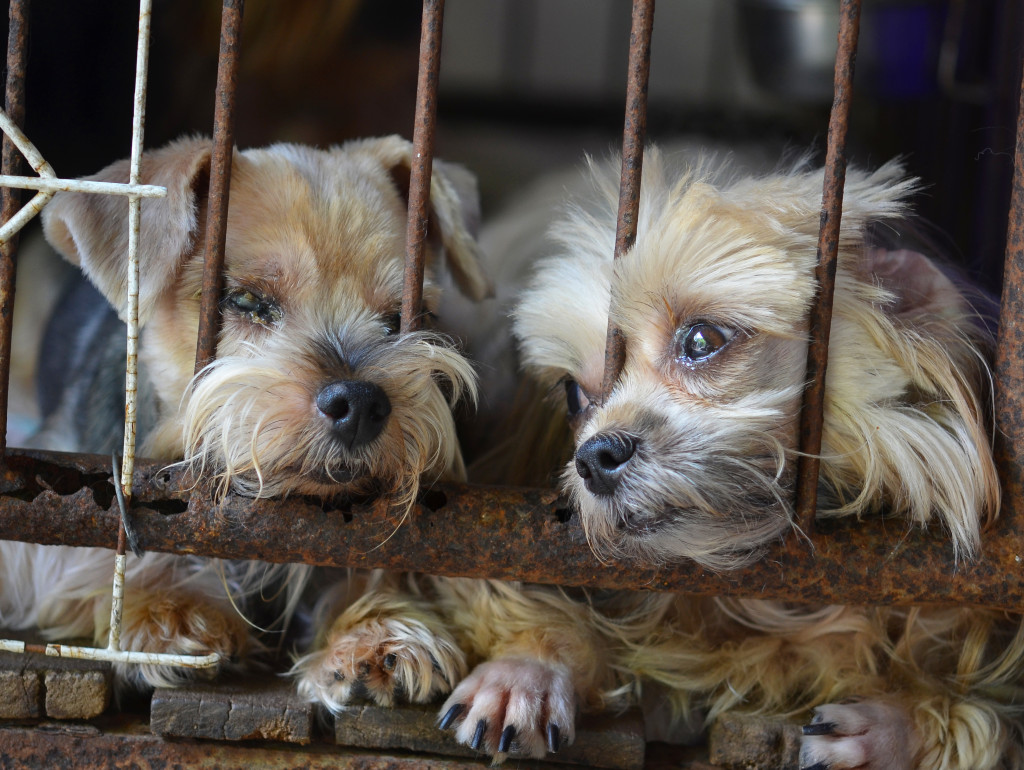
We obviously have a long way to go, but in 2015 our movement made significant progress toward tackling the abuse of animals: in puppy mills, in homes, in shelters, and on farms. Here’s a motivating backward glance to encourage us to redouble our efforts in 2016.
Protecting against abuse in breeding mills
As more cities ban the sale of commercially bred animals in pet stores, those stores and the mills that supply them have been filing lawsuits and losing. A Federal Judge in Rhode Island upheld a local law that bans the sale of commercially-bred dogs and cats from pet stores. Pet stores in the city are now only allowed to adopt out rescued animals from shelters and rescue groups with which they partner. The law was passed based on concerns about the treatment of dogs in puppy mills and in order to increase the number of rescued animals in need of homes who find them. It also strikes to the heart of so much animal suffering: their commodification. When there is profit to be made on the backs of animals, history shows that those backs are often strained and broken.
Likewise, a Federal District Court in Phoenix also upheld the city ordinance there banning the retail sales of purposely bred dogs and cats in pet stores. And yet another Federal District Court upheld a similar Chicago law, dismissing a lawsuit brought by an out of state breeder and local pet stores challenging the City of Chicago’s ordinance.
At the same time, more cities passed such laws including Palm Springs, CA and Camden County, NJ. In the latter, a local pet store closed and reopened with a new mission: rescuing puppies from the street and from shelters.
Protecting against abuse in homes
While counties in New York and elsewhere have passed them, Tennessee became the first U.S. state to pass an animal abuser registry law in order to keep animals out of the hands of abusers. To help others do the same, the No Kill Advocacy Center produced a model law to help ensure that animals are not placed into the hands of convicted animal abusers. By knowing the right lies to tell and which truths to omit, convicted animal abusers can potentially acquire animals from those who lack access to valuable information that would help them make better, more informed choices. This law would strip abusers of this advantage with nothing more than a few strokes of a keyboard.
In addition, the FBI committed to tracking animal cruelty offenses. In the past, the FBI simply considered animal cruelty a lesser offense and reported it in a combined “other” category. The data will be collected as part of the Uniform Crime Report National Incident-Based Reporting System, a program that collects data from law enforcement agencies around the country to provide national statistics on criminal activity.
Protecting against abuse in shelters
A 2015 Federal District Court in Maryland ruled that complaining about inhumane conditions, abuses, or violations of law at shelters is a constitutionally protected right. A volunteer, rescuer, or any other member of the public not only has the First Amendment right to speak out against abuses and violations of law committed by a government shelter, he or she also has a constitutionally protected right to demand that the government correct the wrongs that are identified. The Court also ruled that simply asking volunteers to sign a confidentiality agreement violates their rights. To help others, the No Kill Advocacy Center has a new, updated guide to protecting volunteers and rescuers.
In addition, several shelters, cities and counties banned the use of the gas chamber to kill animals. Once again, to help others, the No Kill Advocacy Center has a guide and model law to do the same elsewhere.
Protecting against abuse on farms
As states across the country moved to pass Agriculture Gag (“Ag-Gag”) laws making it illegal to document and disseminate information on abuses of animals on farms, a Federal District Court ruled that such a law is unconstitutional, the first time a court has done so. Like in shelters, complaining about inhumane conditions, abuses, or violations of law on farms is a constitutionally protected right.
We are the voice of the voiceless. Stand up, speak out, take action.
————-
Have a comment? Join the discussion by clicking here.